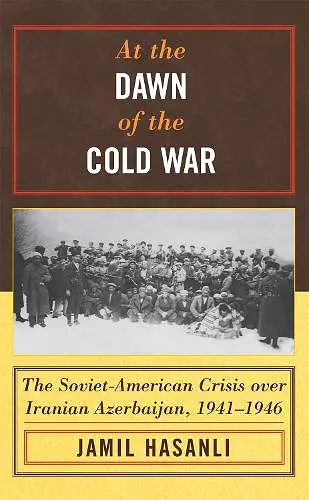At the Dawn of the Cold War
The Soviet-American Crisis over Iranian Azerbaijan, 1941–1946
Format:Hardback
Publisher:Rowman & Littlefield
Published:29th Jun '06
Currently unavailable, and unfortunately no date known when it will be back

For half a century, the United States and the Soviet Union were in conflict. But how and where did the Cold War begin? Jamil Hasanli answers these intriguing questions in At the Dawn of the Cold War. He argues that the intergenerational crisis over Iranian Azerbaijan (1945–1946) was the first event that brought the Soviet Union to a confrontation with the United States and Britain after the period of cooperation between them during World War II. Based on top-secret archive materials from Soviet and Azerbaijani archives as well as documents from American, British, and Iranian sources, the book details Iranian Azerbaijan's independence movement, which was backed by the USSR, the Soviet struggle for oil in Iran, and the American and British reactions to these events. These events were the starting point of the longer historical period of unarmed conflict between the Soviets and the West that is now known as the Cold War. This book is a major contribution to our understanding of the Cold War and international politics following WWII.
[Hasanli] draws on an extraordinary range of newly available documents in this detailed and nuanced examination of an under-explored front in U.S. and Soviet relations. Recommended. * CHOICE *
At the Dawn of the Cold War brings to light a great deal of important information about Soviet actions and plans in southern Azerbaijan. . . . The book provides extensive new information. -- Anar Valiyev * Journal of Cold War Studies *
This is a well-researched book about the birth and demise of the national government of the autonomous republic of Iranian Azerbaijan in 1945–46. Through his discerning and informed use of abundant Russian, Azerbaijani, Iranian, and Western documents, many of them cited for the first time here, Jamil Hasanli sheds new light on less well-understood areas of the beginning of the Cold War. . . . It adds significantly to the scholarship on the Azerbaijan crisis and makes an important contribution to our understanding of that crucial time and place. * International Journal of Middle East Studies *
In dealing with the history of the Iranian crisis of 1945–46, Jamil Hasanli raises very significant and still disputable questions concerning the origins of the Cold War as well as the motives and characteristics of Soviet foreign policy in the first years after the end of the Second World War. The book's undoubted advantage is that the author scrutinized and put into use unique documentary material from the archives of the Azerbaijan Republic, Georgia, and Russia. * Cold War History *
Fills some important gaps in our knowledge of the short-lived government of the Democratic Party of Azerbaijan, 1945–46. That long-ago crisis signaled the beginning of the cold war. . . . Of most interest and usefulness to scholars . . . will be Hasanli’s account of the triangular relationship between Tabriz, Baku, and Moscow during these years. . . . In the final days of the Tabriz government, when it was fighting for its life, Hasanli’s account of dogged and heroic resistance on the part of the Azeris presents a remarkably different picture from that available in most Western accounts. * Iranian Studies *
Based on a treasure trove of new documents from the Azeri and other archives, Hasanli's book is a major contribution to our understanding of the origins of the Cold War. -- Christian Friedrich Ostermann, director, Cold War International History Project, Woodrow Wilson International Center for Scholars
Jamil Hasanli is the leading historian of Azerbaijan. In this ground-breaking volume, he presents the first major English-language study of the Azerbaijan crisis based on both Soviet and Western documentation. Part diplomatic chronicle, part social history, part spy drama, At the Dawn of the Cold War not only brings to light vital new Azerbaijani, Russian, and other sources that clarify in startling detail the roles of Moscow and Baku, it also provides a fascinating analysis that, among other things, underscores the impact of local events on Soviet behavior in the Cold War, and vice versa. It is an important achievement. -- Malcolm Byrne, research director, the National Security Archive at George Washington University
ISBN: 9780742540552
Dimensions: 243mm x 161mm x 37mm
Weight: 730g
424 pages